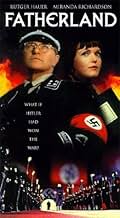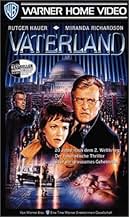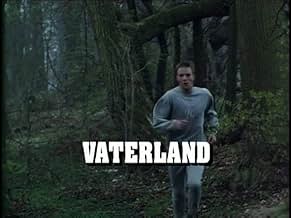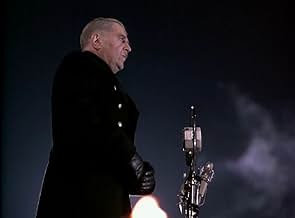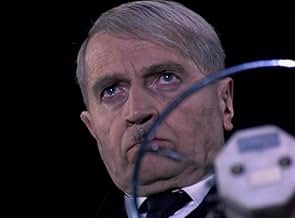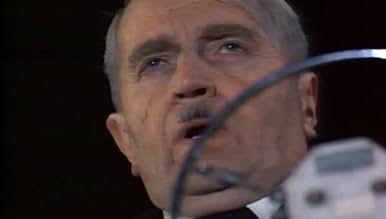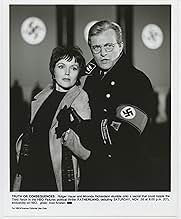Ajouter une intrigue dans votre langueIn April 1964, more than twenty years after the Nazis won World War II, S.S. officer Xavier March uncovers a plot to eliminate the attendees of the Wannsee Conference so that Germany can est... Tout lireIn April 1964, more than twenty years after the Nazis won World War II, S.S. officer Xavier March uncovers a plot to eliminate the attendees of the Wannsee Conference so that Germany can establish better relations with the U.S.In April 1964, more than twenty years after the Nazis won World War II, S.S. officer Xavier March uncovers a plot to eliminate the attendees of the Wannsee Conference so that Germany can establish better relations with the U.S.
- Nommé pour 1 prix Primetime Emmy
- 3 victoires et 5 nominations au total
- Guide Helga
- (as Petronella O. Barker)
Histoire
Le saviez-vous
- AnecdotesThe pompous buildings in post-war Berlin were based on actual plans by Albert Speer, Adolf Hitler's favorite architect and secretary of armaments. Amongst several other landmarks we see a huge dome (the Reichhalle) a Triumph Arch, an Olympic Stadium, and the Reich's Chancellorship. Only the Stadium and the Chancellorship were actually built, but the later was wrecked by bombings and finally looted and demolished by the Red Army. The rest of them were never built, and constructions like the Arch and the Dome were so massive, that architects were unsure of their viability, until recent computer-based simulation have stated that Speer's calculations were correct, and had Hitler won the war, Berlin would have pretty much looked as the movie shows. Interestingly, the movie also portrays Berlin as bleak and gray. In the book, March describes the city looking like this from the never ending construction projects.
- GaffesMost measurements are given in metric, used in Germany since 1876, however when Luther is trying to escape at the metro station his height is given in feet and inches and his weight in pounds.
- Citations
Narrator: [opening narration] It has been 20 years since the Second World War ended with the failure of the Allied invasion of Normandy. A triumphant Hitler declared victory over Europe and the British Empire. The United States withdrew from the conflict, listening to those like Charles Lindbergh, who had argued against a war with Germany. In the East, only the Russians fought on in a bitter guerrilla war. American efforts turned to retribution for Pearl Harbor. That came in the summer of 1945, with victory over Japan. By then, American general Eisenhower returned from Europe to the United States and a humiliating retirement. In 1947, King Edward and Queen Wallis assumed the British throne. Winston Churchill, who had barely escaped with his life after Normandy, died in exile in Canada in May 1953. In the years after the war, country after country of the old Europe had become part of the vast Nazi empire of Germania. The Fuhrer's architect, Albert Speer, built a monument to the Thousand-Year-Reich. Germania's capital, Berlin, became a Nazi showplace. The SS became a peacetime police force, patrolling clean, orderly streets. As the '50s came to a close, Hitler was able to put a more civilized face on the Greater Reich, but news continued to be tightly controlled. The '60s began with the war with the Soviet Union still dragging on. Hitler desperately needed to conclude a formal peace with the United States and forge an alliance against the Russians, still led by the 85-year-old Joseph Stalin. Hitler saw signs of hope in late 1960 with the election of a new President of the United States. The Fuhrer believed with President Joseph Kennedy Sr. in office, at last there would be someone with whom a deal can be struck. Now in 1964, for the first time in 20 years, Germania's borders are being opened to the Americans. The world press is being invited to cover the Fuhrer's birthday celebration on April 20th. There are rumors that President Kennedy will attend a Germanian-American summit conference. An alliance with America would ensure Germania's invulnerability... but there are more persistent rumors that could threaten Hitler's plans. There are stories that something terrible happened in Germany during the war. That the official Nazi story that Jews and other minorities were relocated to the East, wasn't true. There are also rumors that in the Greater Reich, terrible things are still happening. Television, radio, and newspapers are controlled by the powerful Ministry of Information. Nobody, in a new Berlin, dares to ask awkward questions.
- Générique farfeluSarah Berger is credited as as Leni Kalder but is called "Anna" by Xavi.
- Autres versionsAfter the film aired on HBO, a few changes were made for the VHS version. The opening montage of black and white newsreel footage had two or three sentences of narration replaced and the accompanying images changed. In addition, a line was added to the end, an announcer heard over loudspeakers, saying that "President Kennedy is leaving Germany, taking with him the warm wishes of the German people," to make it totally clear to the audience that Kennedy had decided to abandon the alliance with Hitler.
- ConnexionsFeatured in The 52nd Annual Golden Globe Awards (1995)
The original plot is barely recognizable in the film and the reworked ending completely implausible compared to the novel's. (Perhaps the rewrite was a budgetary concern - the novel's climax involves a long cross-country car chase.) Most of the original characters appear, but some are severely truncated and two-dimensional, and one new one is added, seemingly only to speed up the plot! Lastly, the love interest between Hauer's and Richardson's characters has been omitted entirely, which was a vital driving force in the novel's plot.
The upside of the film, if it has one, has already been mentioned in the other review posted here: the juxtaposition of 1960's Europe (the film was shot in Prague, which afforded plenty of great locations) with a Nazi regime (a large poster and statue of an aging Hitler). Truly disorienting and disturbing.
I've not read Harris' comments on the film anywhere, but I'm not sure he's entirely happy with the treatment his great novel got. I know I wasn't. A semi-fun rental if you haven't anything else to watch, but take my advice and read the novel instead.
- timdixon
- 1 avr. 2003
- Lien permanent
Meilleurs choix
Détails
- Durée1 heure 46 minutes
- Couleur
- Mixage
- Rapport de forme
- 1.33 : 1
Contribuer à cette page


